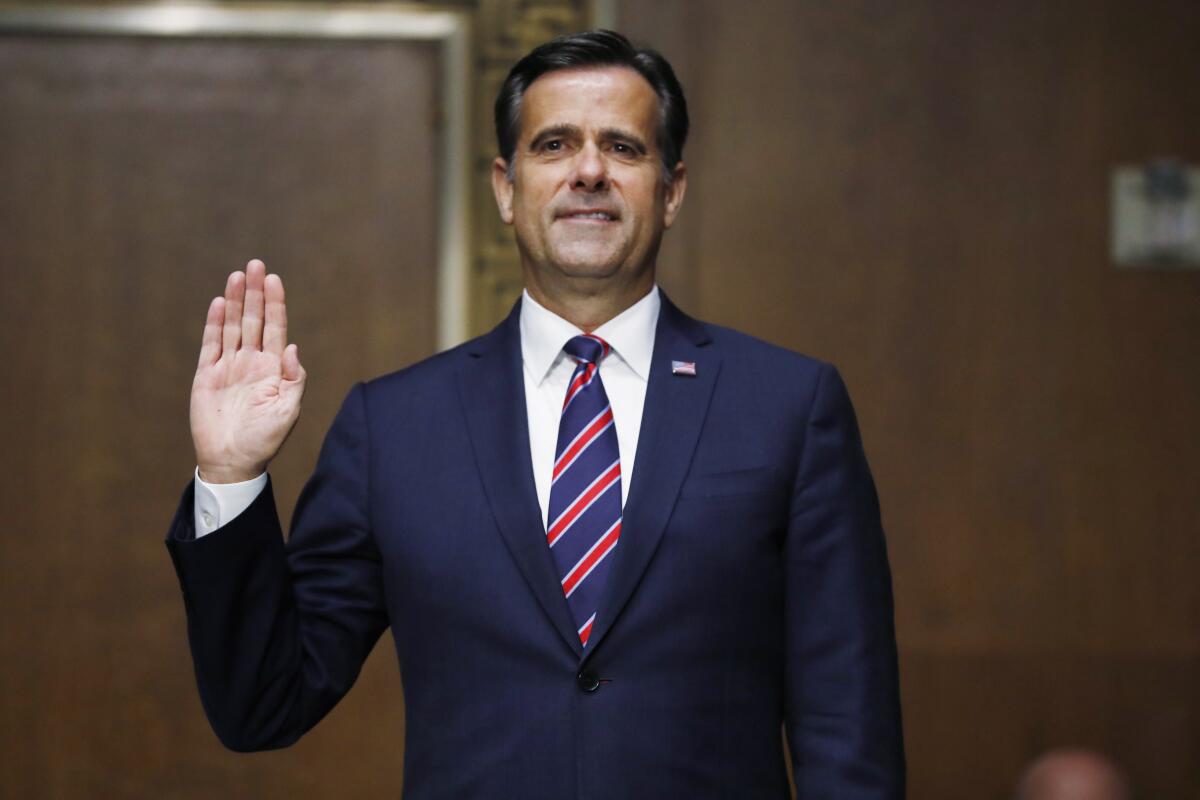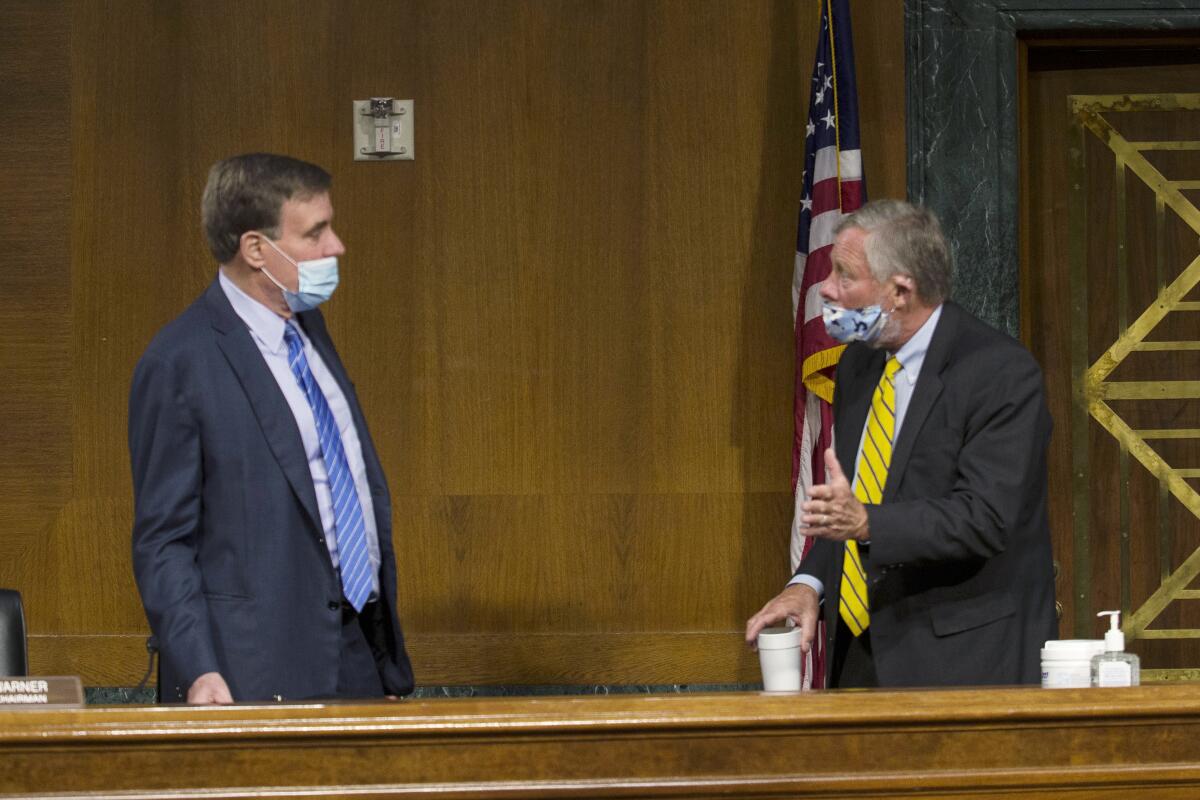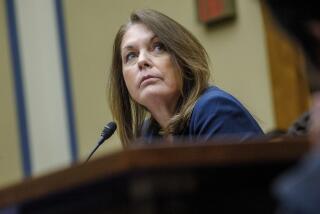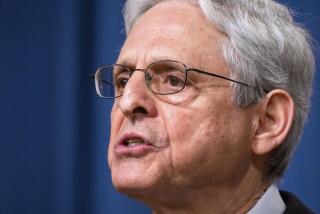Trump’s pick for spy chief, Rep. John Ratcliffe, poised for approval after Senate hearing

WASHINGTON — Last summer, President Trump’s choice for national intelligence director, Rep. John Ratcliffe, appeared doomed in the Senate, where even Republicans worried that his lack of national security experience and his exaggerated resume made him unfit to oversee the nation’s 17 spy agencies.
Trump withdrew Ratcliffe’s name from consideration in less than a week.
But Trump backtracked and renominated Ratcliffe as director of national intelligence early this year, and the Texas Republican appears likely to win confirmation to one of the most important jobs in Washington. After a Tuesday morning hearing in the Senate Intelligence Committee, Sen. Richard M. Burr (R-N.C.), the panel’s chair, said he hopes to hold a vote next week.
“There were no questions that he sidestepped today,” Burr said. “He answered everything and I think he did a very successful job at, one, verifying that he’s more than capable of this job, and two, will serve in an independent capacity.”
Democrats did not share that assessment about Ratcliffe, who drew national attention as an outspoken defender of Trump during the Russia investigation and impeachment proceedings.
“I don’t see what has changed since last summer when the president decided not to proceed with your nomination over concerns about your inexperience, partisanship and past statements that seemed to embellish your record,” said Sen. Mark R. Warner (D-Va.), the panel’s vice chair.
Warner suggested that his Republican colleagues were advancing Ratcliffe’s nomination only because they are eager to replace Richard Grenell, a fierce Trump partisan who has been acting director of national intelligence while still serving as U.S. ambassador to Germany. Warner told Ratcliffe that some senators believe his “main qualification for this post is you are not Ambassador Grenell.”
In his testimony, Ratcliffe pledged to remain independent and to share unwelcome assessments with Trump, who forced out the previous national intelligence director, Dan Coats, after a series of clashes.
“I will deliver the unvarnished truth,” Ratcliffe said. “It won’t be shaded for anyone.”

But he labored to avoid contradicting Trump at the hearing. Only after three senators pressed him did Ratcliffe say he disagreed with the president’s claim that U.S. intelligence agencies — which he would oversee if confirmed — had “run amok.”
Ratcliffe said he couldn’t yet assess other high-profile threats and disputes that would fall under his purview.
He wouldn’t say whether Iran had complied with the 2015 nuclear disarmament deal, which Trump abandoned, although U.S. agencies and United Nations monitors concluded that it had.
Nor would Ratcliffe say whether North Korea had made any progress toward giving up its nuclear weapons, the goal of Trump’s diplomatic outreach to Pyongyang. U.S. agencies say the country continues to expand its nuclear capability, although it has suspended underground tests.
Ratcliffe dodged when asked if Russia sought to help Trump win the 2016 election, as U.S. intelligence agencies have assessed and the president has adamantly denied.
Republicans on the House Intelligence Committee cast doubt on that assessment, which was released in the closing days of President Obama’s administration, while the Senate Intelligence Committee supported the conclusion in a recent bipartisan report.
“I respect both committees,” Ratcliffe said.
Ratcliffe said he agreed that the Kremlin had meddled in the U.S. election, something Trump has sometimes questioned.
“They have a goal of sowing discord and they have been successful in sowing discord,” he said.
Senate Majority Leader Mitch McConnell calls the Senate back as Washington, D.C.’s coronavirus numbers rise.
The hearing showed how the coronavirus crisis has reshaped Washington. Senators were asked to watch from their offices and only come to the committee room to directly question Ratcliffe, who sat on the opposite side of the room.
Several senators wore masks, lowering them to ask questions during the hearing. Ratcliffe did not wear a mask.
Burr said the next director of national intelligence faced special challenges protecting national security during the pandemic.
“Countries around the world have locked down,” he said. “But those threats have not stopped.”
The White House has asked intelligence agencies to help determine whether the coronavirus originated in a Chinese laboratory, a claim that could escalate fraught tensions between Washington and Beijing.
Trump recently said he’s seen evidence supporting the theory, but neither he nor national security officials have revealed any evidence. U.S. scientists have largely discounted that claim.
Ratcliffe said only that he would continue to examine the issue if confirmed.
“The intelligence community will be laser-focused on getting all of the answers that we can regarding how this happened,” he said.
An Illinois native, Ratcliffe served eight years as mayor of Heath, Texas, a small town east of Dallas. In 2007, President George W. Bush named him acting U.S. attorney in the Eastern District of Texas, a post he held for a year before returning to private practice.
Ratcliffe was elected to Congress in 2014 and joined the House Intelligence Committee in 2019. After Trump sought to name Ratcliffe as spy chief last summer, news reports highlighted discrepancies in his resume.
His campaign website said that as a federal prosecutor he “personally managed dozens of international and domestic terrorism investigations involving some of the nation’s most sensitive security matters” and “put terrorists in prison.”
Records did not support those claims, but neither Republicans nor Democrats questioned him about them Tuesday.
More to Read
Get the L.A. Times Politics newsletter
Deeply reported insights into legislation, politics and policy from Sacramento, Washington and beyond. In your inbox three times per week.
You may occasionally receive promotional content from the Los Angeles Times.











